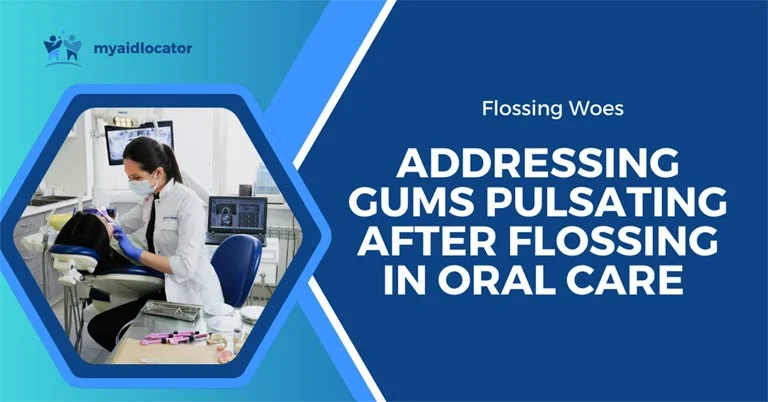Many people have the misconception that their gums pulsating after flossing are due to flossing. Thus they stop flossing altogether. Flossing helps in preventing gum disease and cavities.
Throbbing in the mouth and gums might be the symptom of infection. Otherwise, it could be for brushing too hard or flossing but that’s a rare phenomenon. If it gets unbearable, consult with your dentist as soon as you can.
Are your gums pulsating after flossing?
Flossing is an integral part of maintaining good oral hygiene but for some people; this may come with unexpected vices such as pulsating gums. While this isn’t generally harmful, adjusting your flossing technique to be gentler will help minimize discomfort.
But do not stop flossing thinking that it’s harming you. Flossing if done consistently will prevent the formation of tartar (hardened plaque) on teeth. Tartar can only be removed by a dental professional during a cleaning so regular flossing will minimize its development.
Why You Should Floss Regularly
Flossing removes plaque, if not effectively removed can lead to tooth decay and gum disease. It is a sticky film of bacteria that forms on teeth and along the gum line. Plaque can only be through regular brushing and especially flossing.
Flossing prevent cavities by eradicating food particles and plaque from areas that a toothbrush might not reach. Flossing is especially important in the interdental spaces where cavities often form.
Trapped food particles and bacteria between teeth is the reason behind bad breath. Regular flossing eliminates the food and you will always have fresh breath. Flossing maintains healthy gums and bone around the teeth.
Causes of Gums Pulsating After Flossing
Sometimes brushing or flossing hostilely could result in pulsating gums. Some people apply too much pressure while flossing more than it could take which could be fatal leading to not only pulsating gums but also pain and bleeding along the gum line.
Inflammation of the gums is the sign of early stage of gum disease, Gingivitis. Pulsating gums could be the sign of an underlying infection. If you floss over infected area, you will feel pain along with pulsating or throbbing.
When you floss, the buildup of plaque and bacteria between teeth is disturbed causing the gums to pulsate as a response to the removal of irritants.
People with sensitive gums feel heightened sensitivity during and after flossing. If you use flossing tools that are too thick or not suitable for your oral cavity can cause gum irritation.
Alleviate Pulsating Gums:
- Use a gentle back-and-forth motion instead of snapping the floss against your gums.
- Regular and thorough flossing
- If pulsating gums persist consult with a dentist.
- Rinse your mouth with an antibacterial or antimicrobial mouthwash.
- Gargling with a warm saltwater solution soothes irritated gums.
- Brush your teeth using gentle, circular motions, and use a soft-bristled toothbrush.
Wrap up
Gums pulsating after flossing could be happening for various reasons. Pulsating gums if accompanied by swelling, redness, or pus could be because of infection. The way you floss is very important. Aggressive flossing, especially when the floss is snapped against the gums will end up with gum throbbing.
Remember utilizing gentle flossing technique to floss gently, maintain a consistent oral hygiene routine, and seek professional dental care if you have persistent throbbing and signs of infection. A dentist can detect early signs of gum disease, infections or other issues that can contribute to pulsating gums. Timely intervention can prevent complications.
FAQ’s
If you floss applying a lot of pressure and aggressively it could draw out blood. Or you may have undetected gum disease and when flossed on infected area, blood comes out.
Flossing too aggressively or using a sawing motion can cause trauma to the gum tissue leading to throbbing or pulsating sensations.
Cavities or tooth decay can lead to sensitivity and throbbing sensations. If flossing exposes a cavity or irritated area, it will cause throbbing.
Flossing maintains healthy gums and prevents gum disease. Incorrect flossing however could make gums worse.
Flossing stimulates blood flow to the gums. If there’s an increase in blood flow, it will result in a pulsating or pounding sensation especially if the gums are inflamed or sensitive.

